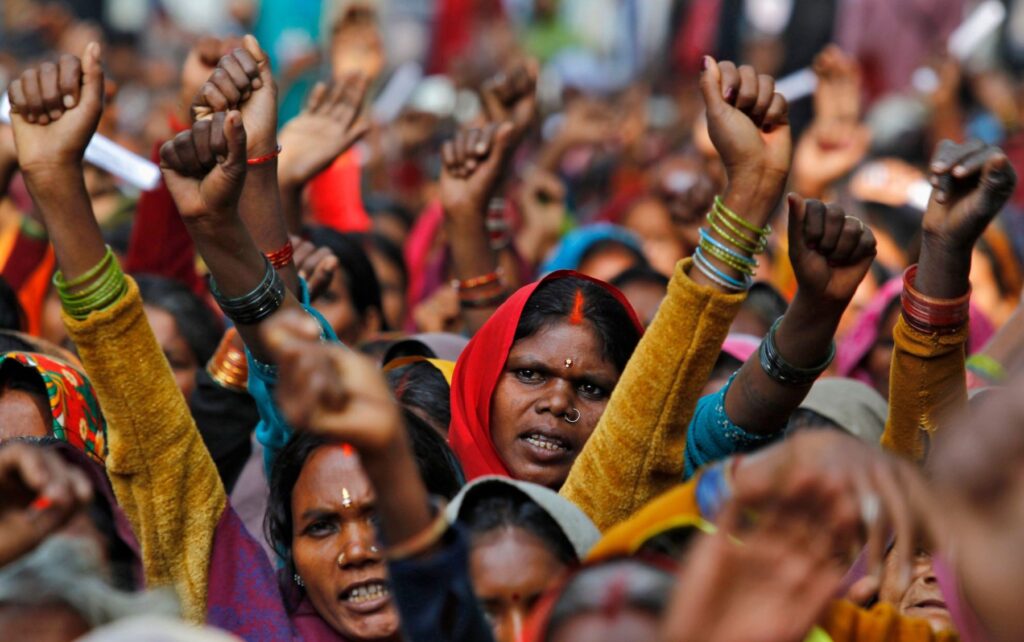Call For New Tribal Policy At The All-India Tribal Convention In AP
May 22, 2023 | Pratirodh Bureau
The tribal convention highlighted tribal medicine, cuisines and other knowledge, including the chanting of 'Sonot jooaar’ – long live nature; Ootey abuwa -- this land is ours, Bir aabuwa – the forests are ours and Disum aabuwa – Desh (country) is ours and ‘Jai Joohar’ (Image: REUTERS/Parivartan Sharma/Alamy)
The one-day All-India Tribal Convention, held in Andhra Pradesh’s port city Visakhapatnam on Sunday, called for a new Tribal Policy to ensure the development of tribal languages, cultures and the setting up of a tribal history academy.
Inaugurated by Vasavi Kiro, renowned tribal author and activist from Jharkhand, the convention highlighted tribal medicine, cuisines and other knowledge, including the chanting of ‘Sonot jooaar’ – long live nature; Ootey abuwa – this land is ours, Bir aabuwa – the forests are ours and Disum aabuwa – Desh (country) is ours and ‘Jai Joohar’.
Kiro stressed that adivasis (tribals) should organise themselves to fight for their rights, noting that forces led by the Rashtriya Swayamsevak Sangh (RSS) are allegedly dividing the tribals and creating rift, according to a press release.
She observed there were more than 700 million indigenous people in the world with 200 million residing in India while alleging that out of these tribes 7,000 indigenous cultures are being ignored and repressed 75 years after independence.
“Adivasis in India suffer because of state policy which is based on ‘development induced displacement’, loot of forests and natural wealth, land alienation, degradation of nature, failure to recognise their indigenous religions like Sarna, attempts to forcefully assimilate them into Hindu religion and failure to implement their Constitutional and legal rights,” Kiro said.
Besides amplifying other pressing needs of the tribals, the convention has also passed four resolutions: Condemning repression of tribals in Burhanpur in Madhya Pradesh, Chhattisgarh and other parts of India; demanding the arrest of BJP MP Brij Bhushan Singh, condemning alleged RSS sponsored violence in Manipur and the gangrape of tribal woman by paramilitary forces at Vakapalli in Andhra Pradesh. More than 600 delegates from 11 states attended the convention and approved the formation of a 15-member Forum Committee as well.
Adivasi is the collective term for the tribes of the Indian subcontinent, who are believed to be the indigenous people of India prior to the Dravidians and Indo-Aryans. It refers to “any of various ethnic groups considered to be the original inhabitants of the Indian subcontinent.” However, Tribal and Adivasi have different meanings. Tribal means a social unit whereas Adivasi means ancient inhabitants. India does not recognise tribes as indigenous people. India ratified the International Labour Organization (ILO) Convention 107 on Indigenous and Tribal Peoples of the United Nations (1957). In 1989, India refused to sign the ILO Convention 169.
The term Adivasi, in fact, is a modern Sanskrit word specifically coined in the 1930s by tribal political activists to give a differentiated indigenous identity to tribals by alleging that Indo-European and Dravidian speaking people are not indigenous. The word was used by Thakkar Bapa to refer to inhabitants of forests in 1930s. The word was used in 1936 and included in English dictionary prepared by Pascal. The term was recognised by Markandey Katju, the judge of the Supreme Court of India in 2011. In Hindi and Bengali, Adivasi means “Original Inhabitants,” from ādi ‘beginning, origin’; and vāsin ‘dweller’ (itself from vas ‘to dwell’), thus literally meaning ‘beginning inhabitant’. Tribals of India and different political parties are continuing the use of word Adivasi as they believe the word unites the tribal people of India.
